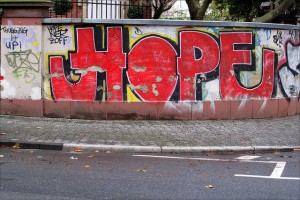About a month ago there was a NY Times interview with Ben Lerer, co-founder and chief executive at Thrillist Media Group. He says, “One thing we preach at work all day long is ‘don’t hope.’ What that means is don’t wait for somebody to do something for you. Don’t do something 90 percent well and hope that it’ll slide through. Don’t rely on luck.” Lerer went on, “It is important to know that you’re giving as close as you can to 100 percent, dedicated effort, and you’re being thoughtful about it.
Definitions of hope: “The feeling that something that is wanted can be had or that events will turn out for the best” (Dictionary.com) or “To desire with the expectation of obtainment” (Merriam Webster).
I’ve been thinking about Lerer’s interview (you should read the whole thing) and how it relates to our nonprofit cultural sector. We live in a world of hope. Like what? Here are some things that we have been known to hope for:
– That a long-shot source of funding will come through to fill our budget gap;
– That our grant request is an exception to guidelines but that we are so special an exception will be made;
– That our expense budgets can increase much faster than the rate of overall economic growth;
– That we can leave a gap in budgeted revenue and it will be filled ‘somehow’;
and many other things.
In fact the nonprofit sector is built on hope — hope for community vitality, hope for educational opportunity, hope for jobs, hope for civic engagement. Many of us are drawn to the sector because we are optimistic people, people who hope because we think that “what we hope for can be had.”
So what would it look like to preach “don’t hope,” and would that change how we operate? I think it would. I think that “don’t hope” is a particularly useful post-recession state of mind. The recession is showing us just how unstable a house built on hope can be.
In a recent meeting, a colleague said they’d have “to hope for a lucky break” to avoid a deep deficit in the coming fiscal year. And that reminded me of Ben Lerer. I thought to myself, “Don’t hope.”
Don’t hope also means DO ACT. Act to the best, fullest of your ability. Act with the conviction that it is actions, not hopes, that will make the critical difference.

